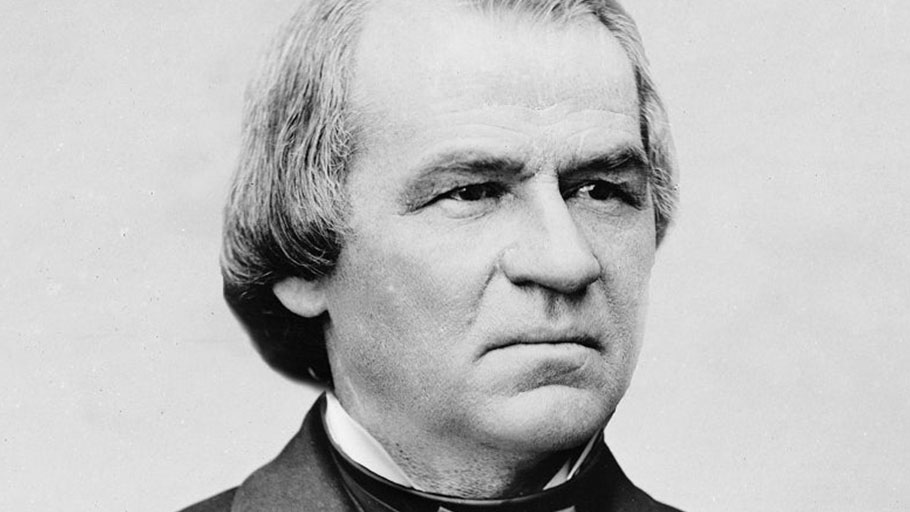President Andrew Johnson. Library of Congress
America’s first impeachment proved it’s hard to impeach for behavior alone.
On this week’s Amicus, Dahlia Lithwick spoke with Kate Shaw, a professor of law at Cardozo Law School and co-director of the Floersheimer Center for Constitutional Democracy. The two discussed impeachment (what else) and assessed what impeachment inquiry is the best comparison for the current investigation—along with what the founders meant when they decided to include an impeachment process in the first place. Their conversation has been condensed and edited for clarity.
Dahlia Lithwick: There’s been a whole bunch of really great articles about Andrew Johnson in the last week or two that have helped illuminate the ways in which (Johnson’s impeachment) is in fact the best template for looking at Trump, in many, many ways more so than Clinton, more so than Nixon. That was an attempt to impeach someone for just an inchoate bundle of demagoguery, in addition to obviously discreet acts, but that there was this bucket of things that was just horrible use of words to threaten sitting members of the Senate, to incite violence in some instances.
And that seems like it’s the closest parallel in some ways, when you’re trying to gather all the strings here of what it is about Trump that makes people nuts. So many of the actions are just these speech acts that are appalling and they don’t, I mean I think there are speech acts at the heart of the Ukraine question too. But I just wonder if you could walk us through a little bit, the Andrew Johnson as parallel, only because here are our articles of impeachment for “Attempt to bring into disgrace, ridicule, hatred and contempt and reproach the Congress,” and then articles about the speeches that he was giving and the incitement involved. And I’m just wondering if you can help me understand if that’s closer to what we’re looking at and how to use Johnson, if at all, as a frame.
Kate Shaw: I struggle with whether Johnson or Nixon is a better analog. I think there are absolutely elements of both in the sort of cluster of allegations against President Trump. I think you’re right, that there are tons of parallels with Andrew Johnson. And so there were 11 articles of impeachment against Andrew Johnson. Nine of them focus on the violation of the statute, the Tenure of Office Act, which he did of course violate by firing his war secretary, in which it’s pretty clear was an unconstitutional statute.
But both the two articles that explicitly talk about things other than that statutory violation, the actual underlying motivation of the Republicans in Congress who were the architects of that impeachment, were not really about the violation of that statute at all. But much more exactly as you were saying: He was an unfit and racist demagogue. That was why he was impeached. And I do think that the historiography of Johnson for a long time, was very sympathetic to Johnson, partly because there were racist historians who believed that he was wronged. But they were also sympathetic partly because this idea that the unconstitutionality of this statute undermined the entire effort. (Several decades later, the Supreme Court strikes down a very similar statute.)
So Turley in his testimony, which I’m sure we’ll get to, seems much more sympathetic to the (I think now being discredited) position that Congress overreached, Johnson was wronged, history has vindicated Johnson.
There were other reasons for which Johnson was impeached, mostly the racist demagogue. And how that was manifested was his systematic attempt to undermine reconstruction. Vetoing Civil Rights Act, Freedman’s Bureau’s bill, the Military Reconstruction Act, attempting to undermine ratification of the 14th Amendment. Attempting to readmit the Southern states and to empower former Confederate officials, appointing them governors, things like that. And essentially to hand the South something like a partial victory in the war they had decisively lost.
And that was why he was impeached. It was a much deeper, sort of philosophical dispute or disagreement about the future of the country. And that, you can characterize that as a policy disagreement. You can characterize it as a deep constitutional values disagreement. It clearly wasn’t about the violation of this one statute.
And so the problem, I think, with leaning too heavily on the Johnson metaphor is that the enumerated offenses were rather flimsy in Johnson’s. Where I think the enumerated offenses that we are likely to see in the articles of impeachment that will be drafted in the coming weeks are far stronger in the case of Trump. So while they, while it is true that there is, I think, a lot that congressional Democrats are animated by apart from this narrow sequence of events, not so narrow, but sequence of events involving Ukraine, they also have a much stronger set of allegations.
So I think that’s the one reason I would resist leaning too heavily on the Johnson analogy, and why I think the Nixon analogy is important, because the substantive offenses are quite similar in all kinds of ways I feel like we’ve a little bit underappreciated.
You’ve really dug into the history of how the Framers chose the words they chose. In other words, what was on the menu for the Framers when they were drafting the language of impeachment, what they took out, what they kept in, why they kept it in. And I think that history becomes really important when you’re hearing professor Karlan and professor Gerhardt, professor Feldman, professor Turley all talking about whether this high crimes and misdemeanors thing is too broad, too narrow, and what goes in. Help us understand what the Framers were trying to include, and what they were explicitly trying to take out that their British forebears had included in impeachment.
Sure. And I will say it was so interesting how largely originalist the terrain of the debate during the congressional hearings was, and I know I’m not an originalist and yet I actually do think this is a sphere in which it is extremely useful to spend some time grappling with the founding era materials. In part because there’s so little else to work with, right? Much of the time we have founding era materials and several hundred years of practice, and it’s some combination of examining all of that, that I think helps illuminate present meaning. And here I think we have to do that too, but we just don’t have that many examples to work with.
And there is relatively extensive, although it’s spotty, the actual constitutional convention history. But there is some documented history and part of the reason I actually think it’s so useful here is because so much originalists debate is cherry picking examples from a very mixed historical record. And both sides can deploy originalist arguments about what people at the time understood or what the Framers might’ve intended. And you end up at a stalemate. And here I don’t think that’s the case. I actually don’t think the evidence is particularly conflicting.
“He was an unfit and racist demagogue. That was why he was impeached.” — Kate Shaw
Before they even get to the language, obviously they have to decide whether there’s going to be an impeachment provision at all. And there’s actually some debate about that. There’s this argument that they were setting the whole thing up. So one of the things they decide is the President will be subject to reelection and four year terms. And there is an argument that that is the way to deal with the need to expel a president, is to expel him through the electoral process.
“Vote him out.”
Literally “vote him out” is on the table at the constitutional convention. And they decide that’s not going to be enough. Right. Sometimes presidential misconduct is going to be so dangerous—and this is key—and sometimes it will involve attempts to manipulate elections to entrench a president in power. So that’s not going to work, just to rely on elections.
So they say, “We will create an impeachment process. It will include the president.” In England, there had been impeachments for hundreds of years of ministers and things like that and under the king, but the king was not subject to impeachment. So that is a huge and important distinction between American practice and English practice that some of the law professors during the Wednesday hearing focused on. And so yes, we’re going to have impeachment and yes, it will include the president.
And so then, OK, who’s going to have the power of impeachment? They think about maybe the Supreme Court should do it. Maybe the majority of state legislators can do it. They decided to give the power to Congress, divide it between the House and the Senate, and then write the critical question: So how will we define the conduct that will warrant impeachment? And so again, there’s some records and it’s not a perfect transcription of everything everyone’s said, right? So there’s some selectivity, but they think about, initially the first proposal is for impeachment for malpractice or neglect of duty.
So truly just being really derelict in discharging the duties of the presidency. And that language quickly gets replaced with treason, bribery, or corruption. So that’s actually a pretty big shift. It’s pretty broadly agreed that malpractice, neglect of duty, is just too low a bar, right?
Right. Who among us has not neglected?
We all have our days. And so then, OK, so then there’s a shift to something much more serious. Treason, bribery, corruption. Corruption ends up getting removed, and just treason or bribery remains for a little bit. So there’s a minute in which that looks like it’s going to encompass these two discreet and serious categories of misconduct. But so then George Mason, who was really an important player in all of this, adds maladministration, which is another cut basically at this malpractice, neglect of duty, and had been used in some English impeachments.
This term, this had been the charge: maladministration. But that too, is subject to the objection that it doesn’t set a high enough bar. So Madison wants to do something else. He says, “Why is the provision restraint to treason and bribery? Treason as defined in the constitution will not reach many great and dangerous offenses.” But Madison also thinks that maladministration is not quite right. He says, “So vague a term will be equivalent to a tenure during pleasure of the Senate.” Right. The Senate basically can accuse anybody of maladministration, or the House has to accuse, but the Senate could remove anybody.
So Mason takes out maladministration, replaces it with high crimes and misdemeanors. And that’s sort of it in terms of the, I mean there are some other secondary records, but in terms of the actual, the key records that seem that’s most of what’s recorded. And so you don’t have much more that the Framers have said about it during the convention.
You look to some of the things that they said, they wrote in the Federalist Papers, they wrote in exchanges of letters, in speeches and you begin to get a sense that there are a few things that they seem to be most concerned about. And one of them is this idea of foreign influence, right? This is a young country, the English and the French are still vying for influence and the idea that a president could be subject to corruption or influence, undue influence by a foreign government, seems to be a huge concern.
So that seems to be sort of one. Two is corruption and self-dealing, abuse of office for personal gain of any sort. And then there are a number of things said in various venues that do suggest that a president’s attempts to entrench himself in power are also the kind of thing that might warrant impeachment. So the election and election manipulation is also something that comes up. So you take stock of the roughly contemporaneous commentary and there actually is, I think, pretty consistent set of themes that you see arising.
This article was originally published by Slate.














